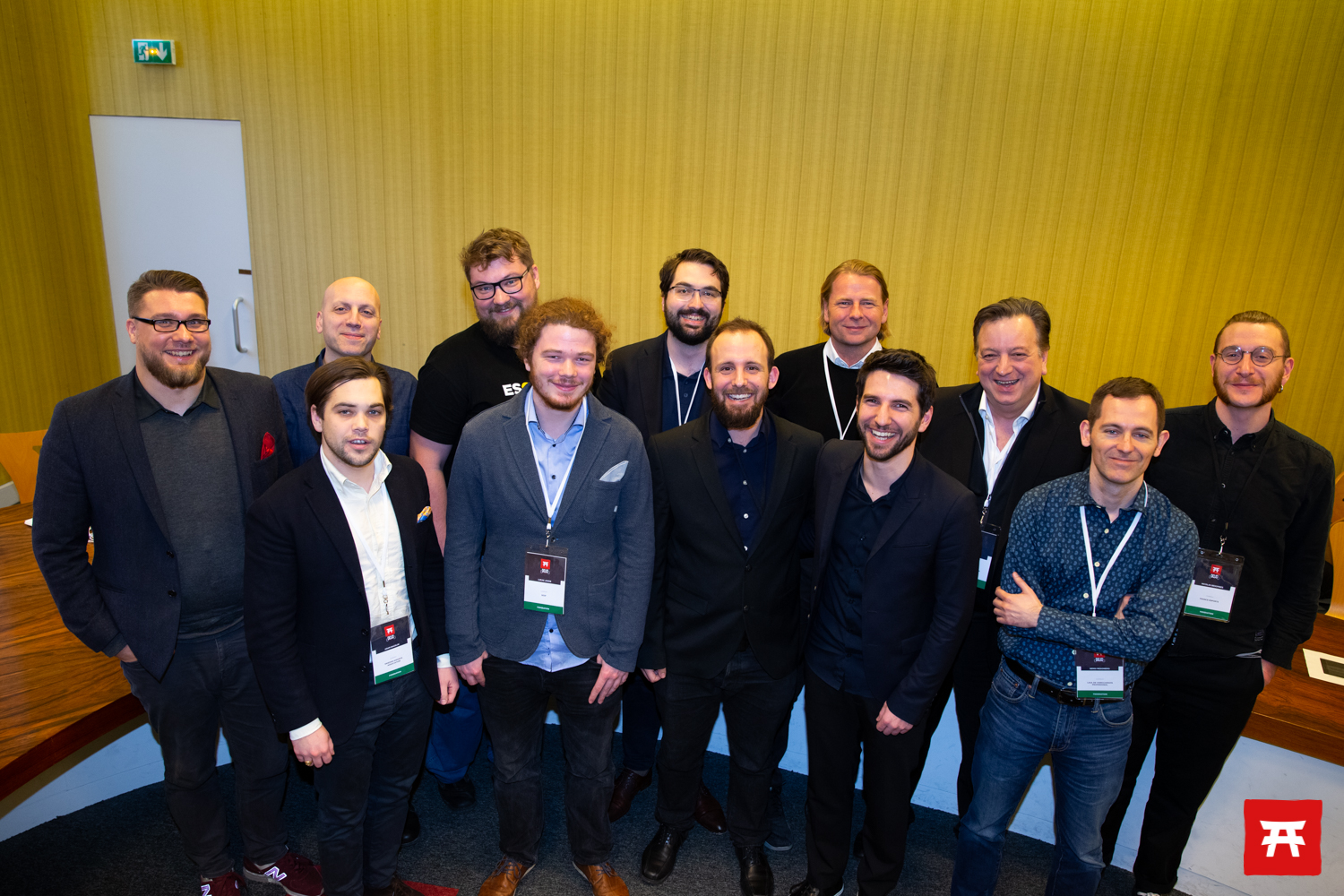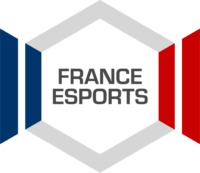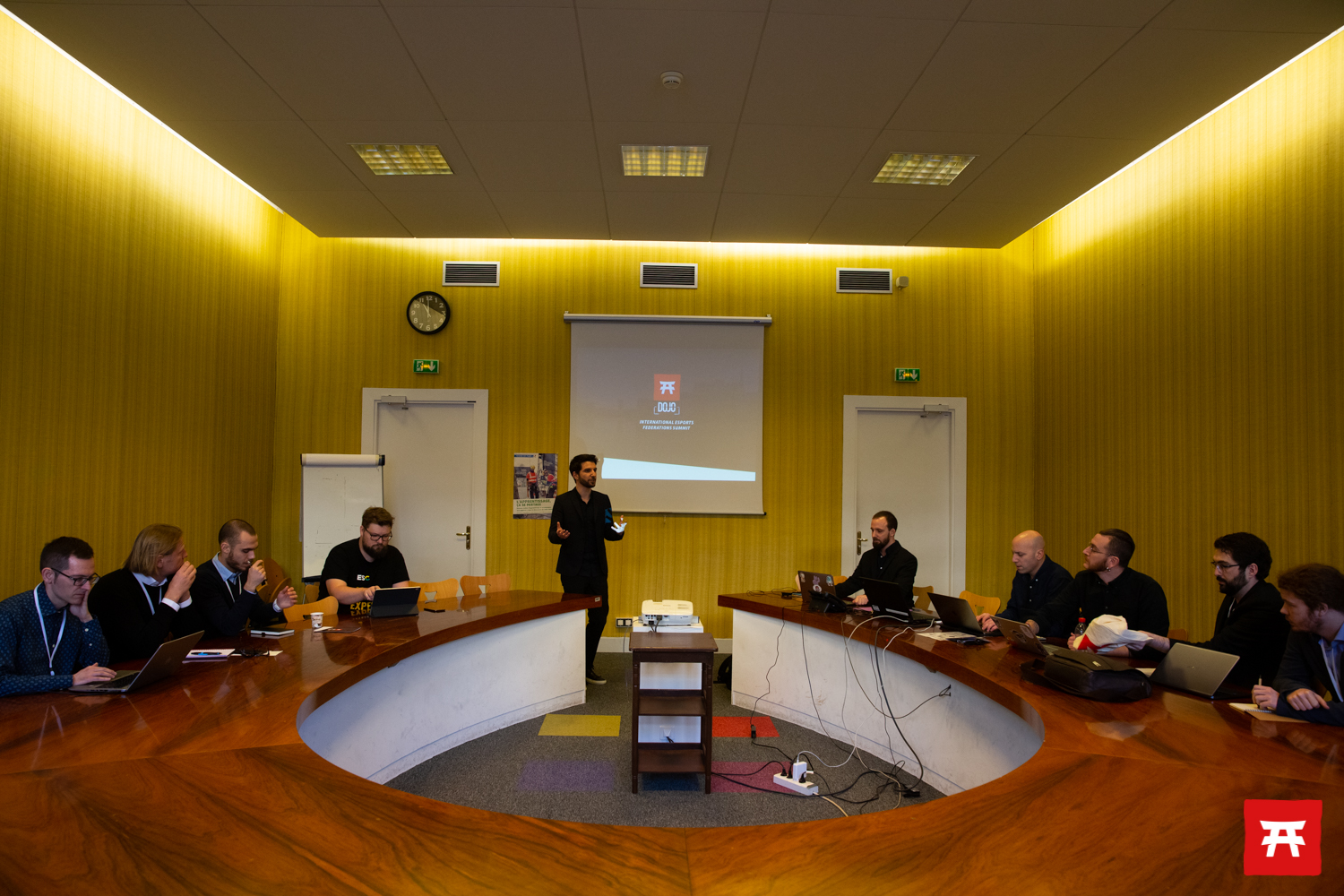A first European gathering
As part of the third edition of DOJO Esport, a series of conferences held at the city hall of Paris on the 18th of January 2018, the organisers of the event (JK Production and Smartcast Ninja) as well as the association France Esports, welcomed the International Esports Federations Summit.
Many national organisations in Europe, which had been identified as representative governance bodies in their respective countries, had been invited, and so Germany (ESBD), Great Britain (BEA), Spain (AEVI), Italy (FIES), Sweden (SESF), Switzerland (SESF) and Ukraine (UFES) met on this day which was dedicated to them. Representatives from the ISFE (International Software Federation of Europe for the publishers), the INSEP (National Institute of Sport, Expertise, and Performance for the sports division) and the IOC (International Olympic Committee for the Olympic division) were also present as observers.

The International Relations Department of France Esports, in collaboration with the DOJO organisers, had prepared an agenda in order to address a potential international, or at least European, cooperation between the various associations present.
This meeting was an opportunity to start collective reflection on coordinated actions between the different international actors, and to indirectly follow up on meetings and discussions that took place during the Esports Forum, which was organised by the International Olympic Committee (ICO) and the Global Association for International Sports Federations (GAIFS) in Lausanne in July 2018.
This event also underlines France Esports’ readiness to share its initiatives in a transparent manner in order to participate in the development and the sustainability of a responsible esports practice at the international level.
Very heterogeneous models
The morning was mainly devoted to introductions of everyone present at the table and of their respective organisations, with particular attention to the following three points:
- the governance and representativeness of all actors of the local ecosystem;
- their relationship with their national public authorities (governments or traditional governance bodies for sports)
- their relationship with the rightsholders of different games (game publishers)
This discussion revealed the immense diversity of national models and specificities (notably due to specific institutional and legislative contexts). The following points highlight some of these disparities:
Several countries are in a situation where several organisations are claiming the role of a national federation. Discussions have showed how delicate it is to address issues of representativeness and legitimacy. Does legitimacy stem from seniority? Affiliation with an international entity? The relationship with public authorities? The representativeness of the local esport network? Actions undertaken? The intentions of the representatives? The lack of lucrative goals of the organisation?
Other countries stressed the importance of having a democratic internal structure, which allows the participation as well as the expression of players and organisations of all sizes. The France Esports model, pioneer of the integration of rightsholders as members through a dedicated board, sets itself apart in particular in its aspiration to bring together all stakeholders. The publishers have reaffirmed their willingness to participate in the development of the entire esports ecosystem, and to not reduce their thinking to the professional scene of their games and the protection of their international property only.
Regardless of the unsolvable debate if esports is a sport, a more pragmatic question emerged. Should those organisations, should they desire so, be recognised as sports organisations? Some countries are working in this direction because of local legal specificities, while others are considering a different approach, which would see esport recognised as a separate sector, without being directly affiliated to sports. Indeed, although in some countries, being recognised as a sport would only be advantageous, it could lead to many regulations and constraints in others, which could be an obstacle in the proper development of all stakeholders in the industry. The local public authorities (specific ministries or departments) involved within the national authorities are then directly correlated to this choice: in some cases, they are traditional sports governance bodies (the ministry and National Olympic Committees), in others, they are ministries of youth, education, economy, industry or of new technologies and the digital. Some organisations already have well established links with some ministries, which have resulted in concrete legal actions adapted to esport.
In regard to the representativeness of the stakeholders of the ecosystem within national organisations, the presence of rightsholders is very heterogenous. Some countries do not necessarily benefit from the presence of direct contacts to publishers in their own territories. In this case it was suggested that the national organisations concerned should contact the rightsholders at the European level directly.
In addition, not all national organisations have the same activities. Some organise competitions (championships, leagues, etc.), others offer training to referees and tournament administrators, and some focus on raising awareness among the general public. The actions carried out and the priorities set are therefore not the same in each country.
However, all present actors are aligned with the societal challenges that national bodies have to address issues of diversity, integration, public health, education, etc. These themes were all mentioned, in one form or another, in the presentations of all present actors.
Finally, one of the common characteristics of these different organisations is how they are all relatively recent: all were founded between 2008 and 2018, and each undeniably lacks perspective on the proper functioning and responsibilities of an esports governance body at the national level.
A complex but not impossible standardisation
The afternoon was mainly devoted to the definition of esport. It became clear to the actors present that a common nomenclature was necessary, both to align everyone’s actions, but also to have a coherent interpretation of the different data from the esport industry. If the stakeholders in the esports world do not succeed in bringing about a globally accepted definition, chances are that others will do so in the coming years. The example of Argentina, where violent games are not recognised as esports and of the German Olympic Committee, which wishes to distinguish between esport (sports simulations) and egames (which would include all other competitive games), were cited.
Many criteria were questioned by the various representatives, such as asynchronous competition (superplay, speedrun, scoring), competition (taking into account casual practice), equity of opportunity and RNG (concerning in particular games qualified as pay-to-win), and new technologies (VR, AR, drones, etc.) without a consensus being reached.
This exchange finally allowed everyone to grasp the difficulty of the process and stimulated reflection for a future meeting, all while raising awareness among organisations to establish a common nomenclature.
More regular meetings in the future
This first meeting was undeniably very enriching and particularly useful for all participating organisations: esport ins indeed an intrinsically dematerialised and therefore borderless practice, that follows a globalisation process in which it isn’t the only actor. That is why it is crucial to keep up regular exchanges with our counterparts abroad in order to standardise our models and actions. However, the workload is huge, and the time frame will be long before this will become more concrete in the shape of the emergence of a strong and legitimate European entity. The second meeting will therefore be held in April 2019 during the Games Week in Berlin, as it will be our German colleagues who will welcome us in order to continue these discussions.
Photo credit: Quentin Missault – JK GROUP
Translation by Amandine Koch / Swiss Esports Federatio

